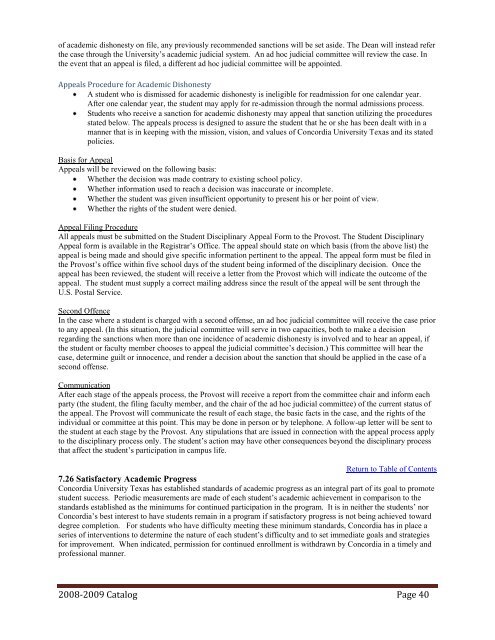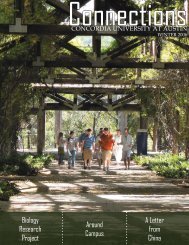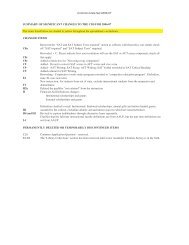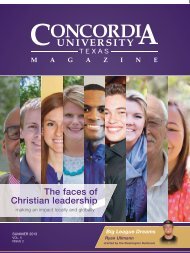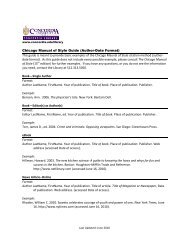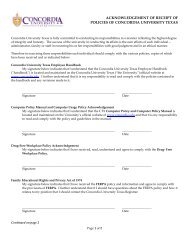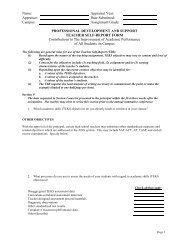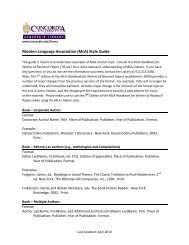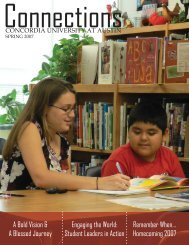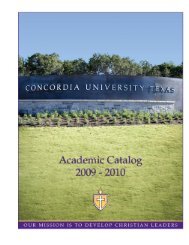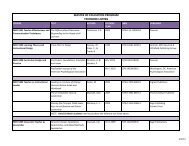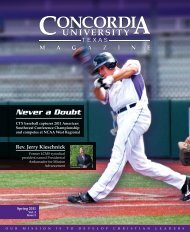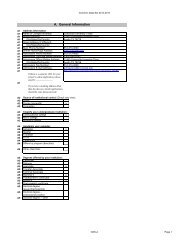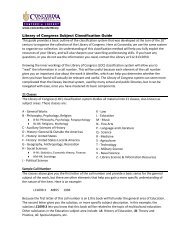Course Catalog 2008-2009 - Concordia University
Course Catalog 2008-2009 - Concordia University
Course Catalog 2008-2009 - Concordia University
Create successful ePaper yourself
Turn your PDF publications into a flip-book with our unique Google optimized e-Paper software.
of academic dishonesty on file, any previously recommended sanctions will be set aside. The Dean will instead referthe case through the <strong>University</strong>‘s academic judicial system. An ad hoc judicial committee will review the case. Inthe event that an appeal is filed, a different ad hoc judicial committee will be appointed.Appeals Procedure for Academic DishonestyA student who is dismissed for academic dishonesty is ineligible for readmission for one calendar year.After one calendar year, the student may apply for re-admission through the normal admissions process.Students who receive a sanction for academic dishonesty may appeal that sanction utilizing the proceduresstated below. The appeals process is designed to assure the student that he or she has been dealt with in amanner that is in keeping with the mission, vision, and values of <strong>Concordia</strong> <strong>University</strong> Texas and its statedpolicies.Basis for AppealAppeals will be reviewed on the following basis:Whether the decision was made contrary to existing school policy.Whether information used to reach a decision was inaccurate or incomplete.Whether the student was given insufficient opportunity to present his or her point of view.Whether the rights of the student were denied.Appeal Filing ProcedureAll appeals must be submitted on the Student Disciplinary Appeal Form to the Provost. The Student DisciplinaryAppeal form is available in the Registrar‘s Office. The appeal should state on which basis (from the above list) theappeal is being made and should give specific information pertinent to the appeal. The appeal form must be filed inthe Provost‘s office within five school days of the student being informed of the disciplinary decision. Once theappeal has been reviewed, the student will receive a letter from the Provost which will indicate the outcome of theappeal. The student must supply a correct mailing address since the result of the appeal will be sent through theU.S. Postal Service.Second OffenceIn the case where a student is charged with a second offense, an ad hoc judicial committee will receive the case priorto any appeal. (In this situation, the judicial committee will serve in two capacities, both to make a decisionregarding the sanctions when more than one incidence of academic dishonesty is involved and to hear an appeal, ifthe student or faculty member chooses to appeal the judicial committee‘s decision.) This committee will hear thecase, determine guilt or innocence, and render a decision about the sanction that should be applied in the case of asecond offense.CommunicationAfter each stage of the appeals process, the Provost will receive a report from the committee chair and inform eachparty (the student, the filing faculty member, and the chair of the ad hoc judicial committee) of the current status ofthe appeal. The Provost will communicate the result of each stage, the basic facts in the case, and the rights of theindividual or committee at this point. This may be done in person or by telephone. A follow-up letter will be sent tothe student at each stage by the Provost. Any stipulations that are issued in connection with the appeal process applyto the disciplinary process only. The student‘s action may have other consequences beyond the disciplinary processthat affect the student‘s participation in campus life.Return to Table of Contents7.26 Satisfactory Academic Progress<strong>Concordia</strong> <strong>University</strong> Texas has established standards of academic progress as an integral part of its goal to promotestudent success. Periodic measurements are made of each student‘s academic achievement in comparison to thestandards established as the minimums for continued participation in the program. It is in neither the students‘ nor<strong>Concordia</strong>‘s best interest to have students remain in a program if satisfactory progress is not being achieved towarddegree completion. For students who have difficulty meeting these minimum standards, <strong>Concordia</strong> has in place aseries of interventions to determine the nature of each student‘s difficulty and to set immediate goals and strategiesfor improvement. When indicated, permission for continued enrollment is withdrawn by <strong>Concordia</strong> in a timely andprofessional manner.<strong>2008</strong>-<strong>2009</strong> <strong>Catalog</strong> Page 40


